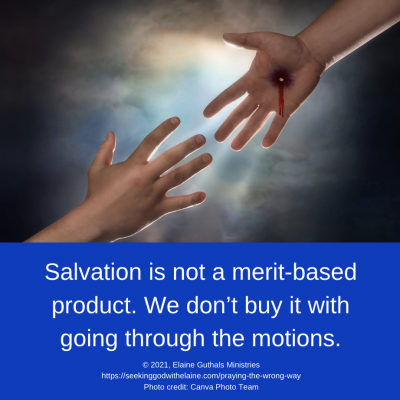Jesus told the Parable of the Pharisee and the Tax Collector to teach us how to pray. This daily devotional shows us how the Pharisee prayed the wrong way.
Nuggets
- It is right for us to go to God’s house to pray.
- The Pharisee’s prayer reflected what was in his heart; unfortunately it was not after God’s heart.
- The Pharisee mistakenly prescribed to a works-based salvation instead of salvation by grace.
Devotions in the Luke’s Diagnosis and Prescription series
Devotions in the How Should We Pray? series

The parable that Jesus told about the Pharisee and the tax collector teaches us how to pray. He also teaches us that prayer isn’t about appearances. The Israelites — and we — should have known God doesn’t look at the outside.
What did God tell Samuel when He picked David to be the next king? “But the LORD said to Samuel, ‘Do not look on his appearance or on the height of his stature, because I have rejected him. For the LORD sees not as man sees: man looks on the outward appearance, but the LORD looks on the heart” (I Sam. 16: 7 ESV).
By Jesus’ day, the Pharisees seemed to have forgotten that. They were content with their ceremony and religion.
Jesus reiterated that God wants our relationship and submission. In this parable, He warned the Pharisees — and us — to not judge outward appearances and circumstances.
Let's Put It into Context
Previously, we took a quick surface look at these verses. The nuggets we came up with were
- We discipline ourselves by devoting ourselves to prayer.
- God isn’t focusing on the minutes – He is focusing on the attitude.
- But the Pharisee wasn’t devoted to prayer because he made the prayer all about himself.
- The tax collector knew he was still a sinner after conversion — he was just a forgiven sinner.
To read a related devotion, click the button below.
Let’s see what we come up with through a deeper look.
Setting Up the Parable of the Pharisee and Tax Collector
“He also told this parable to some who trusted in themselves that they were righteous and looked down on everyone else: ‘Two men went up to the temple to pray, one a Pharisee and the other a tax collector” (Lk. 18: 9-10 CSB)
It is right for us to go to God’s house to pray.
Jesus told this parable to Pharisees that were in the crowd listening to Him. He patterned the first character after them.
Person of Interest
The Pharisees in the crowd would have looked down on the tax collector. All of the newer versions translate publican as tax collector. The King James Version keeps the publican.
Liddon reminded us what the Pharisee and the tax collector had in common. They both saw the value of prayer. They took their time to pray to God in His house.
Resource
The Pharisee’s True Colors Showed in His Prayer
“The Pharisee was standing and praying like this about himself: ‘God, I thank you that I’m not like other people — greedy, unrighteous, adulterers, or even like this tax collector’” (Lk. 18: 11 CSB)
The Pharisee’s prayer reflected what was in his heart; unfortunately it was not after God’s heart.
The first character in the parable that we meet is the Pharisee. The Pharisee should have gotten it correctly, right? Well, apparently he didn’t. Let’s break it down.
One problem is the Pharisee didn’t get it down to the heart level. We just looked at the Greatest Commandments.
• “And you shall love the Lord your God with all your heart and with all your soul and with all your mind and with all your strength” (Mk. 12: 30 ESV).
• “… You shall love your neighbor as yourself …” (Mk. 12: 31 ESV).
To read a related devotion, click the button below.
Other than the salutation, the Pharisee doesn’t mention God at all. He said nothing about having ABCDed. Cook was right. He really didn’t know God at all.
Resource
The prayer is only about him. (I think he forgot that prayer is a two-way communication with God.)
In his prayer, the Pharisee just compared himself to other people — and of course, he found himself superior to them. (Why would he compare himself to someone he thought was better than him?)
Seiss pointed out the same thing — he just said it better. He wrote, “The mistake of this Pharisee was, that he compared his outward life with the lives of disreputable people, and so took to himself the credit of exalted superiority.”
Resource
It is easy to see that there were a lot of people the Pharisee did not love. His heart was full of arrogance — and that was clearly on full display.
Hughes made a very good observation. He felt that what Jesus was saying here was that we can become self-righteous.
Resource
The Pharisee’s self-righteousness could have been the result of two things. The first could have been self love. It manifests itself in that arrogant behavior.
The second way we feel self-righteous is because we compare ourselves to others with whom we feel contempt. Censoriousness is about being critical of others. Jortin pointed out that, sometimes, this judgment can be groundless.
Resource
The Pharisee here was, at a minimum, being critical. Where is the second greatest commandment in that? Nowhere. In fact, it sounds like the exact opposite — hate instead of love.
The Pharisee is making a very big assumption that God sees him as better than the tax collector. Liddon felt this assumption was because “he supposes that sin is measured solely by its quantity and weight, and not by the opportunities or absence of opportunities in the sinner.”
Resource
Instead of talking relationship, the Pharisee talked works. That is the things he controlled.
A Wrong Conception of Works
“I fast twice a week; I give a tenth of everything I get” (Lk. 18: 12 CSB)
The Pharisee mistakenly prescribed to a works-based salvation instead of salvation by grace.
What the Pharisee didn’t get was it isn’t about us. It isn’t about what we do or not do — how good we are.
It is about accepting — in the Pharisee’s case — what God was going to do for him. God provided the Savior.
Currier said it beautifully. He wrote, “It is not the spoken service that is regarded, but the hidden words of the heart.”
Resource
If God based salvation on a works-based system, none of us would ever step one toe into Heaven. We will never be able to consistently — constantly — keep God’s laws and commandments.
We will never be 100% fruit-of-the-spirit perfect until we get our new bodies.
Thank You, God, for looking at our hearts.
But what is God really looking for when He looks inwardly? He is looking for motivation. Have we really submitted our lives to Him? Are we using the Sanctification Road to change our characters to be like His?
Glossary
God doesn’t want lip service. He wants changed lives.
I keep remembering what I heard or read a couple of years ago. If our actions don’t match our words, our words are manipulative.
How do we try to manipulate God? We do when we think we deserve His blessings without a full commitment to Him. We do when we think the ceremony of religion is enough without the submission to Him.
Salvation is not a merit-based product. We don’t buy it with going through the motions.

As Robertson said, the Pharisee had the ceremonial goodness, but not the moral goodness. Hughes pointed out that the thanksgiving was there, but not the gratitude. I would contend, though, that the thanksgiving was skewed.
Resource
Instead of searching for God and loving him, we are deceiving ourselves when we think we can be self-righteous. That is not the way to salvation and eternal life.
How are we self-righteous? We are when we think being a good person is good enough to get us eternal life. Ooo, baby. That really brings it home, doesn’t it?
To read a related devotion, click the button below.
Well, look at it. The Pharisee was banking on what he did to gain God‘s favor. Yes, they were things God approved of – fasting and tithing.
But isn’t that basically what the Pharisee was saying? He felt he could be good enough and be accepted by God. Yes, he was using religious ceremony to justify himself, but some worldview people use only following the second greatest commandment as justification of being good enough.
Taylor said something that stopped me in my tracks. He wrote, “How vain must be the hope of those who expect heaven because they are not so wicked as others.”
Resource
Ooo, baby. I never thought of it that way. We generally don’t think that Heaven will be filled with the holier-than-thou types. But when we add that some worldview people who think being good enough is enough, we realize how far some people are from having a right relationship with God.
What Jesus was saying that the Pharisee needed — and the worldview people need — and all of us — was a personal relationship with God.
The relationship is based on our humility. Humility is a character trait that diminishes pride and places dependence on God while holding a modest view of our importance with respect to others.

Making the Connections
Wow! Liddon was brutal. He wrote, “Not to pray is not merely godless: it is, in the larger sense of the term, inhuman.”
Resource
What does all of this tell us? We need to pray, but we have to make sure we pray in the right way.
Why do we pray to God? Liddon told us that, too.
We have to determine what God is and what we are not. God is virtuous, perfect, and holy. We are not.
Winterbotham argued that the Pharisee probably did have much to give God. He felt that the Pharisee did have a better character than the tax collector. Either way, the Pharisee had much for which to be thankful.
Resource
However, the Pharisee in the parable was like so many of the Pharisees of Jesus’ day. They were hypocrites.
How Do We Apply This?
- We can’t think we are equal to or above God. We have to humble ourselves before Him.
- We can’t rely solely on religious ceremony. We have to have a personal relationship with the Father through the Son.
- We need to replace our pride with humility.
- Seiss suggested that we compare ourselves with someone we would want to emulate — how about Jesus?
- Our works aren’t going to get us anywhere — only belief in Jesus’ atoning blood will.
- Thank God for His grace and watchcare over us.
Resource
Liddon warned us to take care in our interactions with others. He wrote, “If any one point is clear in our Lord’s teaching it is this — that to whom much is given of him shall much be required, and, as a consequence, that in the case of the man to whom much is given a slight offence may be much more serious than a graver crime in another, at least in the eyes of the Eternal Justice. This consideration should prevent a readiness to compare ourselves with any others.” This advice takes on more weight when we consider that only God truly knows the heart of a person.
Resource
We don’t want God to be a symbol to us. We don’t want Him to be a character in a book we keep on the shelf.
We want God to be our Father. We want to have His character. We want to be humble and thankful.
Father God. You don’t look at our actions. You look at our hearts. You see how we really feel about You. Help us to have Your heart. We humbly submit to You. Amen.
What do you think?
Leave me a comment below (about this or anything else) or head over to my Facebook group for some interactive discussion.
If you don’t understand something and would like further clarification, please contact me.
If you have not signed up for the email daily or weekly providing the link to the devotions and the newsletter, do so below.
If God has used this devotion to speak with you, consider sharing it on social media.
Pingback: Praying the Right Way – Seeking God with Elaine